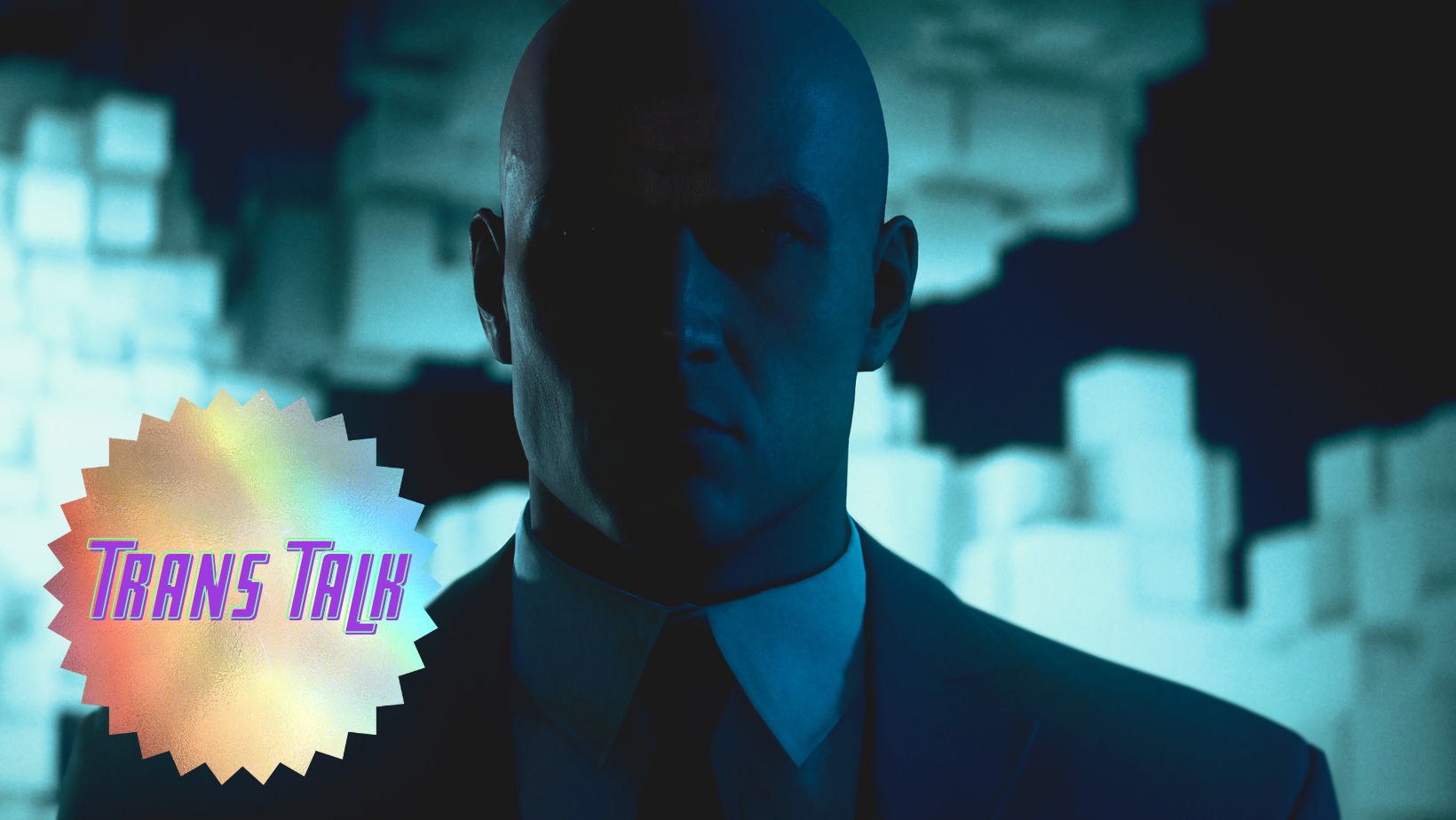Trans Talk is a series of conversations, each bringing a different trans person to the table to have short discussions about a topic they feel strongly about identifying as trans.
Our guest this month is media archivist and film critic Esther Rosenfield, who you may know from her scathing Dear Evan Hansen review on Letterboxd, or any one of her great pieces on films, like those on Alita: Battle Angel and End of Evangelion.
Esther and I have often discussed a variety of video games (see her analysis of the intersection of video games and cinema) and agree as much as we disagree on, well, every game. One subgenre that pops up frequently, and that ties into the last Trans Talk on Don Draper, is one I hate that she adores: stealth games.
—
Juan: Okay, so, I’ve already admitted I hate stealth games, but now let me say why: I suck at them. I am simply a bad stealth game player and would rather burst into a room and just start shooting because I’m a dumb bitch who doesn’t have enough common sense to think ahead particularly far. I blame this impatience on being an Aries, but it’s also what has held me back from actually playing through games like Hitman and frustrates me sometimes when playing things like Metal Gear Solid. Before we dive into anything, I want to know what it is about stealth games that appeals to you and when you got into them.
Esther: The answer to this question is really tied up in what I love about video games in general; getting intimately familiar with a virtual space, learning its contours and quirks, and figuring out how to maneuver within it perfectly. That last point in particular is key to what appeals to me about stealth games, the joy of knowing a space so well that it no longer has any barriers, no longer poses a threat. The Hitman games are particularly great at this, and I think specifically about my first experience with the final level of 2016’s Hitman: Season 1, which is set in a resort hospital for the uber-rich Hokkaido, Japan. The first time you play this level, it seems completely impenetrable. You arrive without any equipment, and the entire place is locked down. Guards are everywhere, the doors are locked, and it seems impossible to quietly knock someone out and take their outfit as a disguise. I wandered around for twenty-odd minutes, completely clueless as to what I could do. And then I found this one tiny gap in a ledge in the courtyard, a little gap that let me swing down onto a pipe, and get into a secure staff-only area. From that little gap, you can get to almost every other location on the map. I play stealth games for moments like that, moments where a space that seems hostile and impenetrable suddenly breaks wide open and becomes knowable.
Juan: See, that’s very interesting to me because I have a completely different approach to games, which is just my approach to most things AKA run in like an idiot and just clown around until I figure things out. I’m very brash, I guess, which is counter to what stealth games require. But I guess that also ties into the way I present and dive into the world. More often than not, my way of playing with gender is very visible, and I actually take some pleasure in having people recognize that there’s nothing stealthy about my presentation of both masculinity and femininity. Obviously, this is because I mostly frequent places that I’d consider “safe” and typically “tone things down” elsewhere, but the more I think about it, the more I realize that navigating, well, the literal world itself as a trans person, isn’t too far removed from a Hitman map (obviously with the consequences not being “real.”)
“It’s the joy of knowing a space so well that it no longer has any barriers, no longer poses a threat.”
Esther: Exactly! There’s this incredible Carta Monir comic that explores how Hitman’s hostile spaces and “enforcer” NPCs who aren’t fooled by Agent 47’s disguises relate a recognizably trans way of moving in the world, as well as offering the option of cathartic responses to being “clocked” that aren’t possible in real life. (Much as we would all love to bonk a transphobe on the head with a crowbar and stuff them in a closet for bothering us in public.) Hitman is all about navigating spaces where you’ll be treated by other people differently depending on how you’re presenting. If you’re dressed as a chef, they’ll think it’s suspicious that you’re in the security office, for example. The game strictly enforces these presentation-based divisions, but 47’s ability to traverse them freely using his ingenuity and presentational fluidity gives a sense of mastery of both the space and the self. 47 begins the most recent trilogy as a blank slate onto which any identity could be projected, and he comes into his own personality and selfhood over the course of the story, eventually accepting that his identity can be infinitely adaptable without being unstable. The game stops short of letting him use female disguises, but within that boundary it lets him be just about anything he wants.
47 begins the most recent trilogy as a blank slate onto which any identity could be projected, and he comes into his own personality and selfhood over the course of the story.
Juan: Okay, first off, that comic just wrecked me. I also went ahead and read Monir’s Lara Croft comic and that approached an understanding of reality through video games in such a different but equally impactful way, which brings me to this train of thought about, like, how much these games that aren’t necessarily designed “for us” end up becoming our main form of identification. The way we’re talking about Hitman here (or the way I discuss stuff like Kingdom Hearts with our friends) is probably not something anyone on staff ever thought about the game (although this may just be me making assumptions), but these sandbox games sort of inherently allow for that kind of room of interpretation.
It is kind of fascinating how much adaptability exists within each level for any given player to find the play style that suits them best, and I personally have spent more time than I care to admit standing around listening to people at a fashion show talking about the world they exist in. I have a level of anxiety about how I’m perceived in the situation, but it also kind of rocks to hover and go completely unnoticed in a dangerous world when you’re playing efficiently; the more clockable you are, the more you “attract” attention, which really speaks to the sad reality of life. I’ve only been playing through Season 1 so far, so I only have a tiny nugget of knowledge in terms of 47’s journey, so I’m wondering: is the recent trilogy a drastic change in approach to the series and character and do the other games sort of fit into this trans reading?
Hitman is all about navigating spaces where you’ll be treated by other people differently depending on how you’re presenting.
Esther: To be honest, I’m less familiar with the previous games in the series! I’ve only played a bit of Blood Money and the original Hitman: Codename 47, and while some of the same mechanics are present (particularly in Blood Money) those games tend to treat 47 as more of a cipher than a character. His role in those games is functional, like a key trying to fit itself to different locks. There’s not much to him beyond standard action-hero cliche. It was really only with the recent trilogy that the developers began characterizing him in meaningful ways, using him not just as a blank slate onto which players could project any intentions, but as a person whose initial blankness represented something important about his personality and his arc.
Juan: I’m curious: does the transness of the stealth game genre jump out in any other games you’ve played in recent years specifically? It feels like so many games just use stealth as something of an afterthought and I feel like this spatial awareness needs to be more ingrained to the character and narrative to be considered.
“In the game, the more clockable you are, the more you “attract” attention, which really speaks to the sad reality of life.”
Esther: To be honest, not really. Hitman is fairly unique these days for its use of such intricate disguise mechanics and complex map design. There are other games with stealth systems that I enjoy (Assassin’s Creed Origins and the recent Sniper Elite games have enough depth to their stealth to be engaging) but none that really suggest transness to me. I’m sure someone out there is screaming at their computer about Metal Gear Solid but there hasn’t been one of those in a long time.
Hitman stands out because its version of stealth isn’t just about sneaking and hiding, it’s about blending in. In most stealth games, getting seen by an enemy means being removed from the stealth state and entering a combat state, at which point you can transition fully into fighting or try to hide again and re-enter stealth. Hitman offers a much broader gray area, giving you a way to get seen by enemies safely and maneuver hostile spaces without being hassled.
Juan: What you’re saying about “blending in” feels particularly important about the game and about sort of existing as trans in that the world, at large, is sort of fixated on this idea of passing. I think about this Emily St. James piece about assimilation and one of the lines that sticks out (that could easily be applied to both the game and reality) is, “There are reasons to blend in beyond self-acceptance. Namely, the world is already cruel, and being trans only ramps up that cruelty. If you can find a way to escape that cruelty, shouldn’t you?”
In Hitman, you’re simply “passing” in as much as it helps you complete your mission (although one could realistically just spend their whole experience with the game just seeing how much they can pass as any particular role without focusing on the endgame), but what happens when your mission is just…literally existing?
Esther: That’s exactly it. Hitman adds mechanics of catharsis to its tension that don’t exist in real life. If I get clocked in public, I can’t just throw a hammer at the person’s head and stash their unconscious body in a closet. After a long enough period of presenting as yourself post-coming out, the alternately joyful and terrifying stress of it sort of just melts away. I don’t get clocked in public anymore, and I don’t anxiously second-guess myself before I go out in a particularly feminine outfit. The fear is mostly gone now, but so is the thrill. In Hitman, I can feel something like that thrill and that fear in a safely cathartic way. I would never go so far as to say that these games are “trans passing simulators” or anything even remotely as stupid as that, but the affection that I have for them will always be tied up with the feelings I have had about going out into the world and giving it new versions of myself.♦
Read previous Trans Talk columns here.
Help make sure LGBTQ+ stories are being told...
We can't rely on mainstream media to tell our stories. That's why we don't lock our articles behind a paywall. Will you support our mission with a contribution today?
Cancel anytime · Proudly LGBTQ+ owned and operated
Read More in Entertainment
The Latest on INTO
Subscribe to get a twice-weekly dose of queer news, updates, and insights from the INTO team.
in Your Inbox














